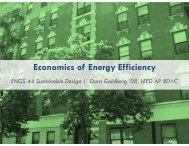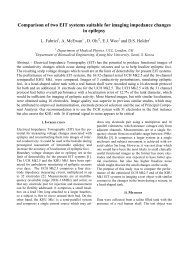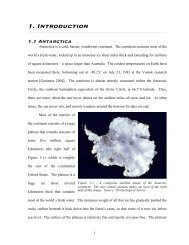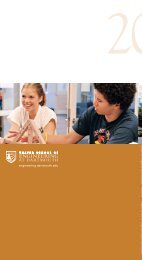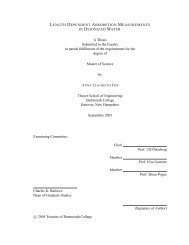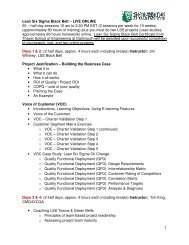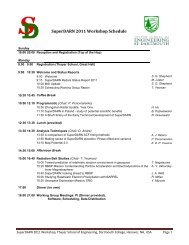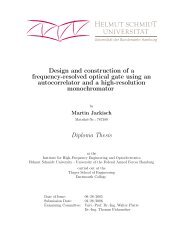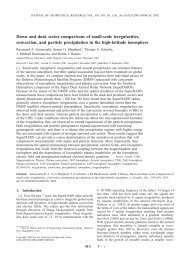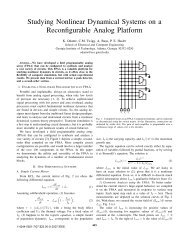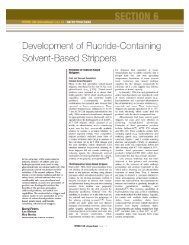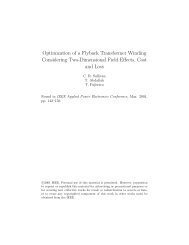Courses Programs - Thayer School of Engineering - Dartmouth ...
Courses Programs - Thayer School of Engineering - Dartmouth ...
Courses Programs - Thayer School of Engineering - Dartmouth ...
You also want an ePaper? Increase the reach of your titles
YUMPU automatically turns print PDFs into web optimized ePapers that Google loves.
graduate courses<br />
ENGG 163 Protein <strong>Engineering</strong><br />
Offered: 11W, 12W: 10<br />
During the previous two decades, breakthroughs in molecular biology and biotechnology<br />
have opened the door to an entirely new discipline focused on nanoscale<br />
engineering <strong>of</strong> highly functional biomolecules. Only in the last 15 years have technically<br />
advanced approaches to protein engineering been developed and leveraged<br />
in solving practical, real-world problems. Looking to the near future, our ability to<br />
create new biomolecular structures with enhanced functional properties will be a<br />
powerful means <strong>of</strong> addressing key technical challenges relating to a diversity <strong>of</strong><br />
contemporary issues including environmentally friendly and cost efficient production<br />
<strong>of</strong> consumer goods and fuels, waste remediation, and development <strong>of</strong> therapies for<br />
debilitating human diseases. A brief review <strong>of</strong> key biochemical principles will touch<br />
on concepts such as the central dogma <strong>of</strong> biology, atomic scale forces at work in<br />
protein structures, and the relationship between protein structure and function.<br />
Strategies for protein structure modification will then be surveyed, with a particular<br />
emphasis on genetic approaches. These discussions will culminate with a detailed<br />
examination <strong>of</strong> evolutionary engineering algorithms that represent state <strong>of</strong> the art<br />
technologies for protein design. The development <strong>of</strong> proteins with practical utility<br />
will be highlighted throughout the term using examples and case studies taken from<br />
the current literature.<br />
Prerequisties: One from ENGS 35 or 160 AND one from CHEM 5 or 10 (Note: one from<br />
CHEM 51 or 57 is preferred). Alternatively, students may have one from CHEM 41 or<br />
BIOC 101. Equivalent courses accepted with instructor’s permission.<br />
Instructor: Griswold<br />
ENGS 164 Cellular and Molecular Biomechanics<br />
Offered alternate years: 12W: 2A<br />
A graduate section <strong>of</strong> ENGS 64 involving a project and additional class meetings.<br />
Not open to students who have taken ENGS 64.<br />
Prerequisites: ENGS 30 or equivalent, ENGS 33 or 34 or equivalent<br />
Instructor: Staff<br />
ENGS 165 Biomaterials<br />
Offered alternate years (not <strong>of</strong>fered 2011–2012): 13S: arrange<br />
Consideration <strong>of</strong> material problems is perhaps one <strong>of</strong> the most important aspects<br />
<strong>of</strong> prosthetic implant design. The effects <strong>of</strong> the implant material on the biological<br />
system as well as the effect <strong>of</strong> the biological environment on the implant must be<br />
considered. In this regard, biomaterial problems and the bioelectrical control systems<br />
regulating tissue responses to cardiovascular and orthopedic implants will be discussed.<br />
Examples <strong>of</strong> prosthetic devices currently being used and new developments<br />
<strong>of</strong> materials appropriate for future use in implantation will be taken from the literature.<br />
Prerequisite: ENGS 24 or equivalent<br />
Instructor: Staff<br />
ENGG 166 Physiology for Bioengineers<br />
(Can be used by undergraduates for A.B. course count only)<br />
Offered: 11W, 12W: 10A<br />
This course is an introduction to physiological principles and concepts necessary<br />
for understanding basic regulatory phenomena and the pathophysiology <strong>of</strong> disease<br />
in living organisms. An analytical approach will be emphasized and terminology<br />
essential for understanding and describing these processes will be developed. The<br />
course will include some aspects <strong>of</strong> cellular biology, excitable tissue phenomena,<br />
cardiopulmonary and renal physiology, and neuroendocrine regulation <strong>of</strong> some <strong>of</strong><br />
these processes.<br />
Prerequisite: Permission <strong>of</strong> instructor<br />
Instructor: Diamond<br />
101



